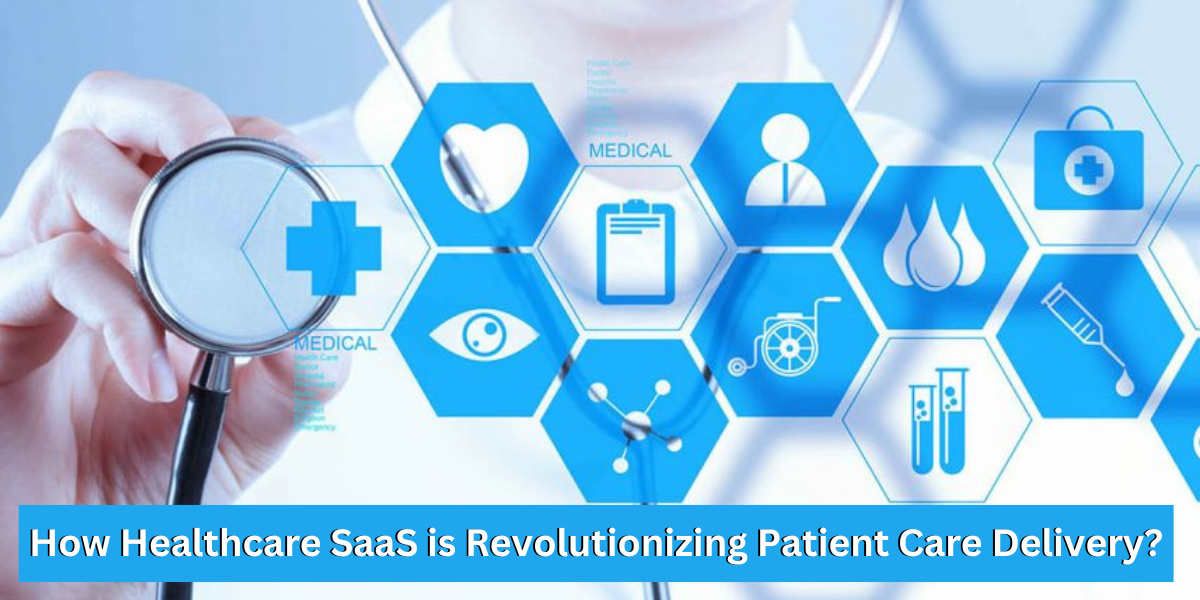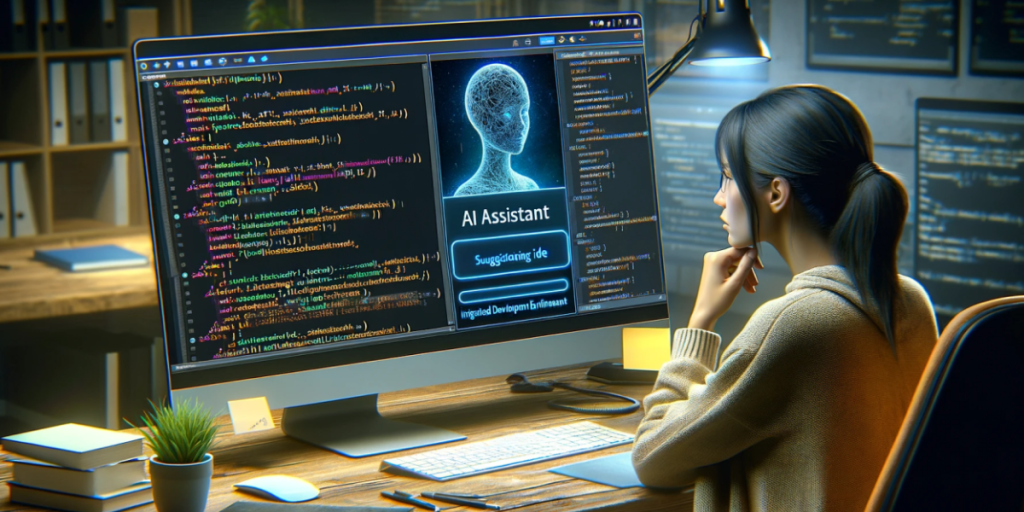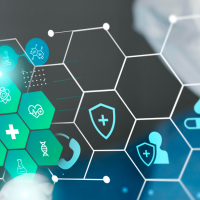Healthcare SaaS, short for Healthcare Software as a Service, is an innovative approach to healthcare. Technology continues progressing rapidly, and SaaS solutions have become increasingly widespread in recent years. The impact on the healthcare industry cannot be ignored. The integration of SaaS solutions is essential. The introduction of SaaS into healthcare has resulted in a shift in how healthcare facilities function. Given its hefty maintenance and costly upgrades, there is no longer a need for traditional Software on-premise installation.
The value of technology in healthcare cannot be understated. Medical records are now digitally stored, and patients can be monitored remotely. Advances in telehealth are only some examples of how technology has revolutionized patient healthcare.
Yet, Healthcare Software As a Service takes this transformative process to an entirely new height, providing various benefits that meet the particular demands of the healthcare industry. This article explores the transformational role of SaaS in healthcare and explains how new technologies have increased patient care, improved procedures, and overall effectiveness.
What Are SaaS Applications In Healthcare?
SaaS, also known as Software as a Service, is a cloud-based service delivery method where third-party or third-party software is accessible to users via the Internet. A third-party provider hosts software applications used in the healthcare field designed to cater to the specific needs of healthcare facilities, doctors, and patients.
SaaS applications allow healthcare providers access to essential tools that do not require large infrastructures or upfront costs. They include Electronic Health Records (EHR) systems, appointment scheduling platforms, and telemedicine applications. They simplify processes, increase collaboration, and improve health outcomes for patients. The use of SaaS applications in healthcare is motivated by the need for higher effectiveness, scalability, and accessibility to healthcare.
The Benefits Of SaaS Applications In The Healthcare Industry
Various benefits emerge from integrating SAAS applications with healthcare sectors. We will look at specific advantages of this and learn how they’re changing how patients are treated and improving productivity in the healthcare industry.
Enhanced Efficiency And Streamlined Workflows
One of the significant advantages of Healthcare SaaS is the enhanced efficiency of healthcare institutions. By using SaaS solutions, healthcare organizations can automate administrative duties that seem mundane, freeing up time for healthcare professionals to concentrate on the patient’s care.
SaaS simplifies the workflow and eliminates manual data entry for everything from appointment scheduling and bill-pay to inventory management and electronic health records (EHR) maintenance. Imagine a scenario where the patient’s information is constantly transferred and updated across different departments in real-time. SaaS can do precisely this, encouraging cooperation and more efficient communication between the healthcare team.
This results in faster decision-making and diagnosis, ultimately leading to better patient care quality. Without the cost of traditional software, the playing field created through Healthcare SaaS is leveled, a game-changer. They can now use modern software without the cost of traditional software, leveling the playing field and ensuring that everyone receives the highest-quality health services.
Improved Patient Care And Engagement
Healthcare SaaS developed by Medical Software Development Company goes far beyond streamlining administrative processes; it also plays an instrumental role in elevating patient care standards. One of the main components of an extensive view of every patient’s medical history and medication Healthcare SaaS is its ability to consolidate and handle the patient’s data effectively. It gives healthcare providers an extensive view of every patient’s medical history and medication tests, results from tests, and treatment plans.
Accessing the latest patient information allows medical professionals to make educated choices quickly. Whether a nurse in the local hospital or a specialist working at the most significant medical facility, they have access to vital patient data instantly and securely. The data flows seamlessly, resulting in improved coordination of medical care, reduced medical errors, and improved patient safety.
In addition, Healthcare SaaS offers tools and apps that encourage patient participation. Patients can access and schedule medical appointments using secure portals provided by healthcare providers. Telehealth solutions, powered through SaaS and telehealth, allow for remote consultations via virtual channels, monitoring of chronic illnesses, and post-discharge follow-ups. These options increase patient experience and boost patients’ adherence to treatment plans, ultimately leading to better healthcare outcomes.
Healthcare SaaS is also the basis for personalized healthcare. By personalizing and analyzing vast quantities of patient information using AI-powered methods, SaaS applications can identify patterns, identify disease risk factors, and provide individualized treatment solutions.
Data Security And Compliance
In the age of digitalization, the protection and confidentiality of patients’ data has become essential. Healthcare data has become SaaS, considers data security a top priority, and adheres to the strictest guidelines set by the industry. Healthcare SaaS providers protect patient data from physical dangers such as fire, theft, cloud-based servers, or natural catastrophes by securely storing data on cloud-based servers.
Data encryption, access controls, and regular security updates protect against unauthorized access to data or use and significant other applicable regulations, which are some of the major advantages of Healthcare SaaS. However, SaaS vendors shoulder the obligation of ensuring compliance, which allows healthcare providers to concentrate on providing care for patients and not be burdened by many regulations.
Cost-Effectiveness And Scalability
Healthcare SaaS provides significant cost savings compared with traditional on-premises software solutions. Subscription-based models eliminate the need for initial capital investment, hardware installation, and ongoing maintenance costs. Furthermore, the ability to scale Healthcare SaaS significantly benefits healthcare institutions regardless of size. When the need for services expands or shrinks, and the software’s flexibility increases, SaaS lets healthcare organizations adapt their software use accordingly.
A rural clinic might start with an affordable subscription and then quickly increase it to accommodate a growing patient base or offer additional services. In contrast, larger hospitals may reduce offerings during periods of less demand sideman, maximizing costs but without jeopardizing service quality.
In addition, Healthcare SaaS often includes periodic updates and enhancements in the subscription plan. Healthcare providers can get the most up-to-date technology and capabilities without incurring additional expenses or dealing with the difficulties of updating legacy software.
Regular Back-ups
One of the most significant benefits of Healthcare SaaS is the assurance of regular backups. Unlike conventional on-site servers, where the institutes are responsible for backing up their information, SaaS applications automatically handle this task. The continuous backup mechanism dramatically decreases the possibility of data loss due to server failure or any other unforeseeable incidents. Healthcare facilities can be confident they are protected by knowing their crucial medical information is safe and easily accessible, ensuring smooth operations and continuous medical care. Ensuring smooth operations and
Enhanced Collaboration And Care Coordination
SaaS solutions allow seamless communication among medical professionals and organizations. Health professionals can safely and rapidly communicate patient data through cloud-based solutions, including medical pictures, patient information, and test results, to facilitate efficient care coordination and collaboration across disciplines. This enhances the quality of medical care, minimizes the risk of mistakes, and ensures complete and integrated patient management.
Real-Time Updates
Healthcare SaaS provides real-time updates, ensuring that the various specialists involved in the case can access up-to-date details. This allows for seamless collaboration between health professionals, allowing the team to work on patient documents and instantly communicate significant changes. Since every doctor can access current data, they can make informed decisions and offer the most accurate and customized care. The real-time update also allows for faster diagnostics and adjustments to treatment and improves results for patients, as well as more excellent overall effective treatment adjustments, improving patient results.
Medical Billing And Revenue Cycle Management
The SaaS-based solutions for medical billing have simplified this process by automating billing processes, improving efficiency, and reducing the time needed for reimbursement. These solutions also help healthcare professionals confirm their clients’ insurance coverage, coordinate the process of submitting claims, and track reimbursements. Transparency and instant reports provided by SaaS billing systems allow healthcare providers to identify and fix any leakage in revenue quickly.
Enhanced Accessibility
Accessibility is the main benefit of Healthcare SaaS, as authorized users have access to patient data anytime and from any location whenever they want. The accessibility feature is a massive benefit for physicians, as they can communicate with one another in remote consultation on difficult situations, providing an efficient and coordinated treatment.
Patients can also enjoy improved access since they can contact their healthcare providers conveniently and with confidence regardless of where they lie since they can contact their healthcare. This facilitates more efficient doctor-patient interactions. Resulting in reduced wait time and ensuring everyone involved in the treatment plan is on the same page. Ultimately leading to better patient-centered medical satisfaction.
Healthcare SaaS Trends
The health industry is undergoing significant changes, fueled by the rise of cloud-based technologies and the rising demand for affordable, accessible, and personalized healthcare. SaaS, is essential to this change since healthcare professionals seek effective and efficient ways to handle patient information and enhance patient outcomes. A few of the significant factors driving the rise of SaaS in the field of healthcare are:
Telemedicine
The pandemic continues to affect people worldwide, and the rise of telemedicine is becoming widespread in providing remote health services. The SaaS-based solutions for telemedicine let healthcare professionals connect with patients in real-time and provide consultations, diagnosis, and treatment without visiting patients in person.
EHR/EMR Adoption
The growth of electronic medical records (EHRs). These solutions, which are based on SaaS, can be more easily accessible, flexible, and affordable than traditional hardware-based systems. They provide immediate statistics that help healthcare providers make more informed choices.
Analytics And Machine Learning
Data analytics and machine learning have become more prominent in healthcare settings as healthcare providers strive to optimize patient results by examining data to discover trends or patterns that become prevalent over time. SaaS solutions offer healthcare professionals the equipment they require to analyze large quantities of information and make informed decision-making regarding the treatment of patients.
Patient Engagement
Engagement with patients is vital to healthcare delivery, as patients seek more control over their wellness and health. SaaS solutions can help healthcare professionals communicate with patients and provide patients access to health records, appointment schedulers, and other vital data through portals for patients and mobile applications.
Healthcare Software Development Services will continue to advance. As providers strive to enhance patient experience while decreasing expenses and providing more accessible care that prioritizes affordability for them. More people adopt cloud-based technologies and data analysis. The future of healthcare is bright, and SaaS will be a crucial component.
Core Characteristics Of Healthcare SaaS Solutions
Healthcare SaaS applications provide a variety of services. However, there are a few essential characteristics that they need to have. The most critical features, such as subscription billing, powerful data analytics, and top-of-the-line data security, should be part of the bundle. We’ll explore the most critical elements essential to Healthcare SaaS apps.
Streamlined Subscription Billing
One of the most distinctive features distinguishing SaaS applications is their basis for billing based on subscription. Users appreciate the ease of using and paying for SaaS applications as they need or after a period of no use.
Automation will reduce the first manual effort, making the process efficient and lowering administrative costs. Customers can easily manage their transactions, saving time and money. For companies, the automated system reduces the time spent tracking payments and ensures compliance with various laws and privacy standards.
Robust Data Analytics
Analytics built into software provide health professionals with essential data that will aid them in making informed decisions and increasing the quality of care. This feature allows for analyzing diverse data types, such as patients’ records, operational statistics, billing, and financial details. One of the main benefits of integrating these capabilities is that it makes it possible for healthcare professionals to measure the efficacy of their treatments and interventions.
Multi-tenant Architecture
The software architecture model is crucial in Healthcare SaaS solutions. This allows several organizations to use the same software, each with dedicated resources. Through multi-tenancy, every organization’s information is secure and separated from the rest, giving the ability to control and customize the program. Furthermore, since many companies use the same technology and infrastructure, application and healthcare service providers could benefit from considerable cost savings.
Reliable And Scalable Infrastructure
To ensure the safety and availability of patient information, healthcare SaaS applications need a highly accessible and robust infrastructure. These capabilities allow apps to offer reliable, performance-driven services continuously. A high level of availability means that the application can be accessed at all times, even in the event of system malfunctions, as well as scalable infrastructure that allows automated resource scaling to handle fluctuations in workloads. This way, the program can manage large volumes of data and requests without overloading.
Enhanced Application Data Security
The importance of robust security measures to guard health-related data must be considered. Healthcare SaaS applications need to implement strong security measures to protect their information. Security measures can deter criminal acts and data breaches. Also ensure that only authorized individuals can access and control sensitive information.
Effect Of SaaS Software On The Healthcare Industry
The SaaS healthcare service comprises cloud-based technology that allows patients to enjoy a more pleasant healthcare delivery experience. Another SaaS health benefit is the ability to use modernized technology that will enable you to facilitate workflows in healthcare to manage businesses better.to make use of the modernization of technology that allows you to facilitate
In managing viewpoints, there are many different perspectives to consider. Delivering the most effective patient experience and managing staff expectations is challenging. SaaS healthcare software development acts as a salvation for healthcare professionals. The reasons behind the rapid connection of the healthcare SaaS platform, as well as the wide selection of applications in medical and healthcare, are:
The Administration Of Medical Documentation
Documents used for managing and recording patients’ medical history are known as clinical documentation. The use of SaaS-based patient records assists in conquering the obstacles and challenges that human error can cause during documenting treatment, and other documenting methods.
Teleconsulting Access
The worldwide pandemic prompted the world market to see numerous solutions that were far out of the realm of imagination. Various healthcare SaaS applications were created in the last few years to offer teleconsultation services. Access to digital health services to patients grew significantly during this time and has helped patients gain improved care delivery.
Electronic Healthcare Information Exchange (HIE)
Electronic health information exchange is one of the most exciting healthcare options, allowing providers to share important information seamlessly. In particular, it is beneficial for the healthcare management of the population. This helps reduce the administration’s efforts to ensure transparency, provide secure data, and reduce medication management mistakes.
Systems For Learning Management In The Field Of Healthcare
Medical education is also part of the healthcare system. Learning management systems (LMS) are cloud-based and provide all-around accessibility for healthcare professionals for learning and teaching within the same environment.
These pointers are a solid basis for healthcare and allow healthcare software developers to benefit from the advancement of health SaaS applications and platforms.
The Potential Future Impact of SaaS On Patient Care
As SaaS grows in maturity and healthcare providers are more proficient in leveraging their capabilities and capabilities. The possibility of transforming influence on healthcare for patients is enormous. From customized treatment plans to improved preventive care via continuous surveillance.
Final Thoughts
The Healthcare SaaS market is increasing as startups emerge everywhere, left and in the middle. In integrating these products alongside existing medical practices, experts can free up time to concentrate on what matters the most: patients. While technology constantly evolves, SaaS development services will make innovating in the medical field easier. SaaS is the future of healthcare and AI Use Cases In Healthcare will greatly help transform patient care. Healthcare SaaS advancement is expected to satisfy the changing requirements of healthcare institutions. As SaaS solutions grow and grow, patients can anticipate a new era of better healthcare and greater efficiency in their healthcare experience.
As healthcare providers remain committed to technological advancement, the opportunity to deliver better quality and accessible patient care is more appealing than ever. The industry is well-placed to meet the current challenges and address future healthcare needs through SaaS healthcare.

























